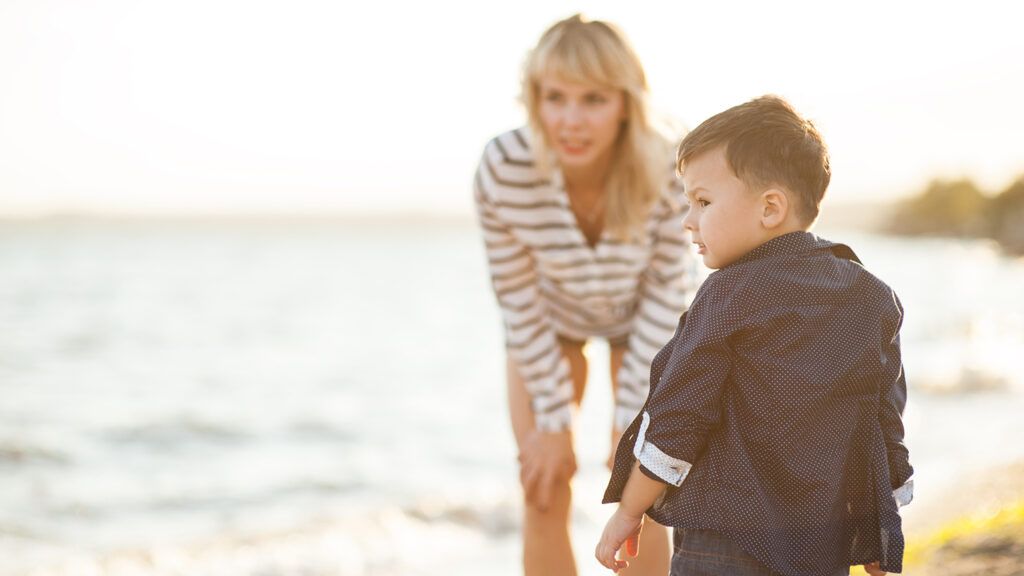It all happened so fast. My dear friend Sandy had just telephoned long distance from Florida to ask if I would consider being godmother to her second child, a newborn son.
Godmother! I was honored. I was flattered. I’d never been asked to be a godmother before. “Sure,” I replied easily.
“You don’t have to answer right away,” Sandy said. “Being a godparent is a serious responsibility. Maybe you’d like to think it over for a few days, maybe even pray about it.”
“Don’t be silly,” I laughed. “I’d love to be Josh’s godmother.”
We talked some more, mostly about the baby and his upcoming baptism, and then, as quickly as it had begun, our conversation was over. Sandy and her new son were 2,000 miles away in the Florida sun, while here I sat in our New York City apartment, staring out the window at the zigzag pattern of fire escapes across the street.
With some unease I sensed that in the course of one simple phone call my identity had taken on a new, uncertain dimension. As mother of two, I was familiar with plain old garden-variety parenthood. But godmother—this was different. This was…
And then it hit me. I hadn’t the foggiest idea what being a godparent meant. What was it Sandy had said about godparenting being a serious responsibility? The way she talked, her request had more to do with Josh than with honoring me. Clearly her expectations were high. But what exactly did she expect?
I thought of my own godmother, my mother’s best friend from her college days. Our families lived thousands of miles apart. On the few occasions our paths crossed, I remembered her as a warm and friendly woman. When I was very young she sent me Christmas presents—sometimes a doll, sometimes a book. Still, I couldn’t recall that she had ever done anything that set her apart as a godmother.
Well, there was no turning back now. For better or worse, I’d impulsively said yes to Sandy’s request. “Father,” I whispered, “please teach me what it means to be a godparent.”
Over the next several weeks I set out to discover everything I could about godparenting. I’m an Episcopalian, my friend Sandy is Catholic, so I talked to a number of pastors. Books on the subject are surprisingly hard to find. I also talked to friends—godparents and godchildren alike—to learn from their experiences. And what I discovered was fascinating.
The tradition of godparenting among Christians is an ancient one going back to the days of the early church, when believers were persecuted—and when life expectancies in general were much shorter than they are today.
While modern-day American believers are not persecuted as the early church once was, it could be said that the healthy growth and development of our children’s faith is threatened as never before by the cumulative effect of society’s ills: widespread divorce; broken homes; rampant materialism; both parents working, out of economic necessity rather than choice; lack of parental supervision; parental mental illness; alcohol and drug abuse; parental physical, sexual and emotional abuse; and the desensitization of our children to violence and sex via unsupervised viewing of inappropriate television, videos and movies.
In other words, kids today need all the help they can get. Over and over I was astonished to hear from clergy and laypeople alike that something so old-fashioned as good godparents practicing good godparenting could make a powerful difference.
In the New Testament, in the Book of Acts, I read about whole households being baptized into faith, including infants, children and servants. Traditionally, the godparent acts as a steward of faith for the newly baptized child, serving as an added assurance (in addition to the parents’ efforts) that the child will be raised to understand fully his or her relationship to God through a personal, saving faith in Jesus Christ.
Today many godparents work to achieve this same blessed goal. Unfortunately, others still wrongly perceive the role as a purely social convention, a way for new parents to honor a family member or friend. With that viewpoint they lose the extra spiritual dimension to the relationship that grants a godparent license to reach out and be something more to the child than an aunt, uncle or “Mom’s best friend.” In fact, I learned of several cases in which it was the godparent who made the difference in a child’s coming to faith.
Even in churches that do not practice infant baptism, or in cases where the person being baptized is an adult, a sponsor is often appointed to serve in much the same capacity as a godparent to the newly baptized person.
As a godmother, I learned that it would be my fight (and responsibility!) over the years to pray for Josh, to introduce him to Christian concepts and to encourage any questions he might have about our faith.
When a person becomes a godparent at a child’s baptism, many churches provide a certificate that includes helpful suggestions and prayers. Much of this is very basic: Pray for your godchild daily, remember your godchild with a gift on his birthday, and—even more important—on the anniversary of his baptism; see that your godchild attends Sunday school and owns an age-appropriate Bible; and so on.
But it was the stories that people shared about their personal experiences as godchildren and godparents that really got to the heart of the task at hand.
One couple, over the course of two decades, had become something of experts when it came to gift-giving to their two godchildren, a boy and girl. Seeking to emphasize the unique spiritual dimension of their relationship to the children, they made a special effort to select gifts that had a specifically religious or inspirational content. Bible storybooks and Noah’s ark toys gave way to tiny gold-cross jewelry and the classic children’s books by C. S. Lewis. When the children entered their teens they received diarylike prayer journals and Christian rock and pop music tapes. Most recently, on the anniversaries of their baptisms, they were sent framed reproductions of the Renaissance painter Fra Angelico’s masterpieces of classic religious themes.
Another friend, who was musical, had a grand time singing hymns and playing the piano with his godson.
Another woman stressed the importance of not only praying for but with her goddaughter. The first time she did this she admitted she felt a little bit embarrassed and shy. But she persisted, convinced that the simple act of praying—or as she put it, “talking to God”—had a profound effect. It demonstrated that praying is something that she, a grown-up, did, and something that the child could do, too. Later she was deeply moved when one afternoon the goddaughter, now grown and in the midst of grave marital problems, called her on the phone. “Oh, Nana,” the troubled girl said, “will you pray with me? I need someone to pray with, and I knew you would understand.”
But by far the most unforgettable godparent I heard of was a member of my pastor’s first parish in South Carolina, nearly 40 years ago. A maiden lady “of a certain age,” Miss B. had no fewer than 26 godchildren.
Fresh out of seminary, my pastor thought that in order to do the job right one should generally not take on the responsibility of being godparent to so many. So he was understandably skeptical when he first learned of Miss B.’s “children.” But after he grew to know her well enough, one afternoon she escorted him to her room to show him the chart she kept at the foot of her bed. Big as a billboard, the chart took up the larger part of the wall; along the top were printed neatly the names of all 26 godchildren, and listed below in columns were their birthdays, baptism anniversaries, favorite books of the Bible, hymns, hobbies, foods, colors, latest accomplishments and more. Miss B. updated the information daily. Her chart, she said, was the first thing she saw in the morning and the last thing she looked at when she went to bed.
This extraordinary woman kept track of every single one of her godchildren’s comings and goings until her death. And in the end, she made a difference.
One young woman, now a nurse with children of her own, recalled how she treasured her relationship as Miss B.’s goddaughter. She appreciated the special notes of encouragement and gifts she had received each year on the anniversary of her baptism. And most of all, what a comfort it had been just to know she was being prayed for by her godmother every day.
Faith. . . prayer. . . comfort. . . make a difference. I kept hearing those words again and again. Being a godparent really was a serious responsibility, as Sandy had said. But yes, now I definitely wanted to do it.
“Thank You, Father,” I prayed. “Help me do a good job for Josh.”
A few days later I was sitting on the kitchen floor wrapping the small porcelain cradle medallion I had selected for Josh’s baptism gift, when my two children bounded into the room.
“What’s that?” asked 4-year-old Brinck.
“A cradle medallion for baby Josh down in Florida,” I said. “See, it’s a picture of an angel escorting a little boy and girl over a rickety bridge in the midst of a raging storm, it shows how God’s angels are protecting us all the time, even when we can’t see them.”
“I like it,” said 7-year-old Katy. “The little boy and girl remind me of Brinck and me. How come you’re sending it to Josh?”
“He’s getting baptized next Sunday. Sandy asked me to be Josh’s godmother, so I’m sending this to him for his first baptism present.”
“Baptism?” asked Katy. “what’s that?”
“Well, it’s sort of like a birthday,” I explained. “When you’re baptized, you’re born into the family of all the believers of Jesus.”
“Birthday?” echoed Brinck. “Do I have a baptism birthday? Can I get a present, too?”
And then a wonderful thought occurred to me. What was to stop me from being a godmother in spirit to my own children, too? For locked within the ancient tradition of godparenting was a fantastic treasure of practices and ideas for believers and the children they love and care about everywhere. A treasure that can make a difference.
“Why, yes, you two do have baptism birthdays,” I said, tying the bow on Josh’s gift. “Katy, as I recall, yours is in October. And Brinck, yours is in April. I’ll have to look up the exact dates.”
“Happy baptism birthday to us!” cried Brinck.
After all, kids these days need all the help they can get.





